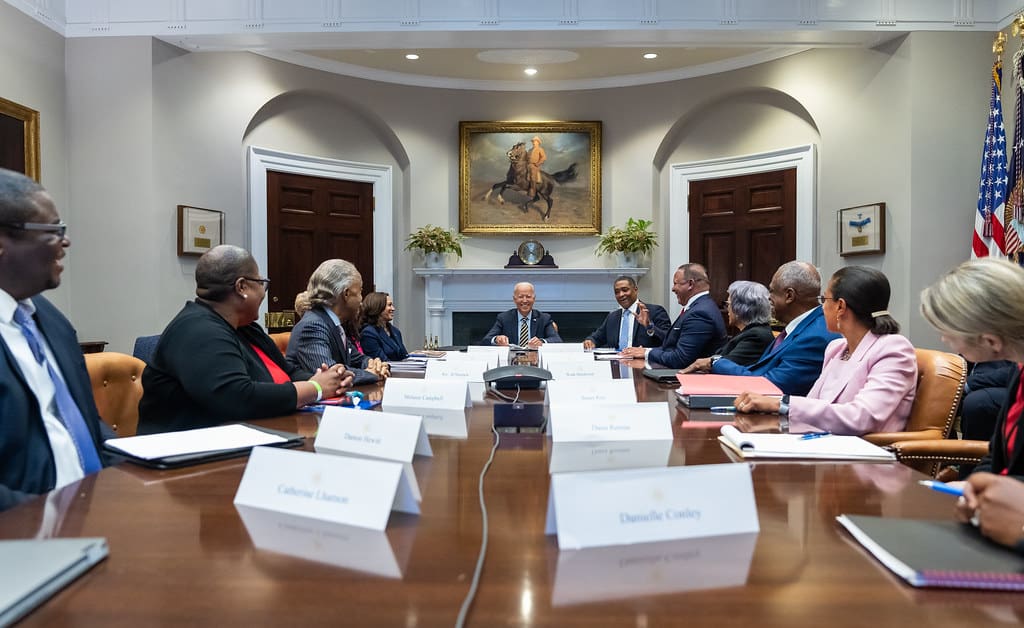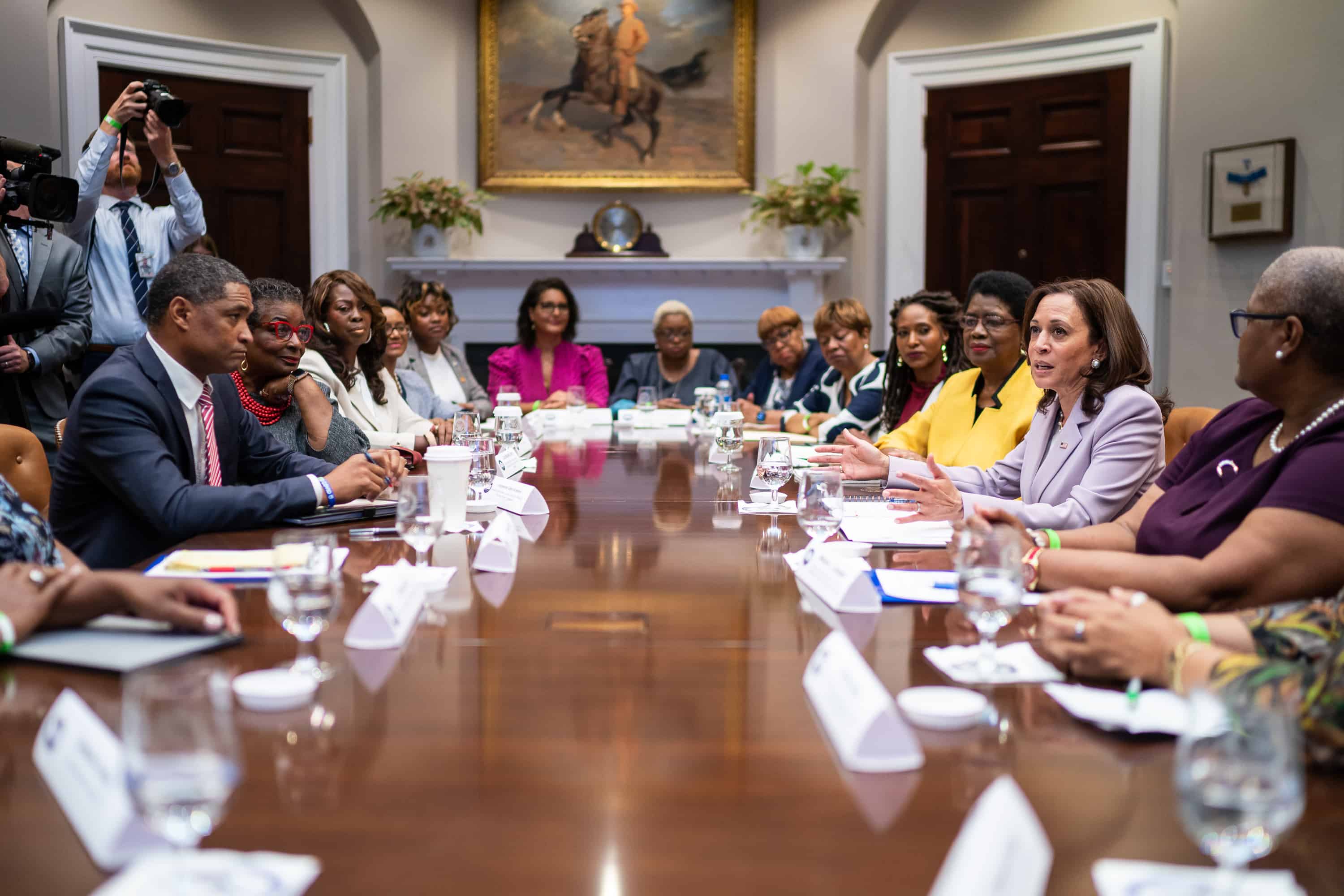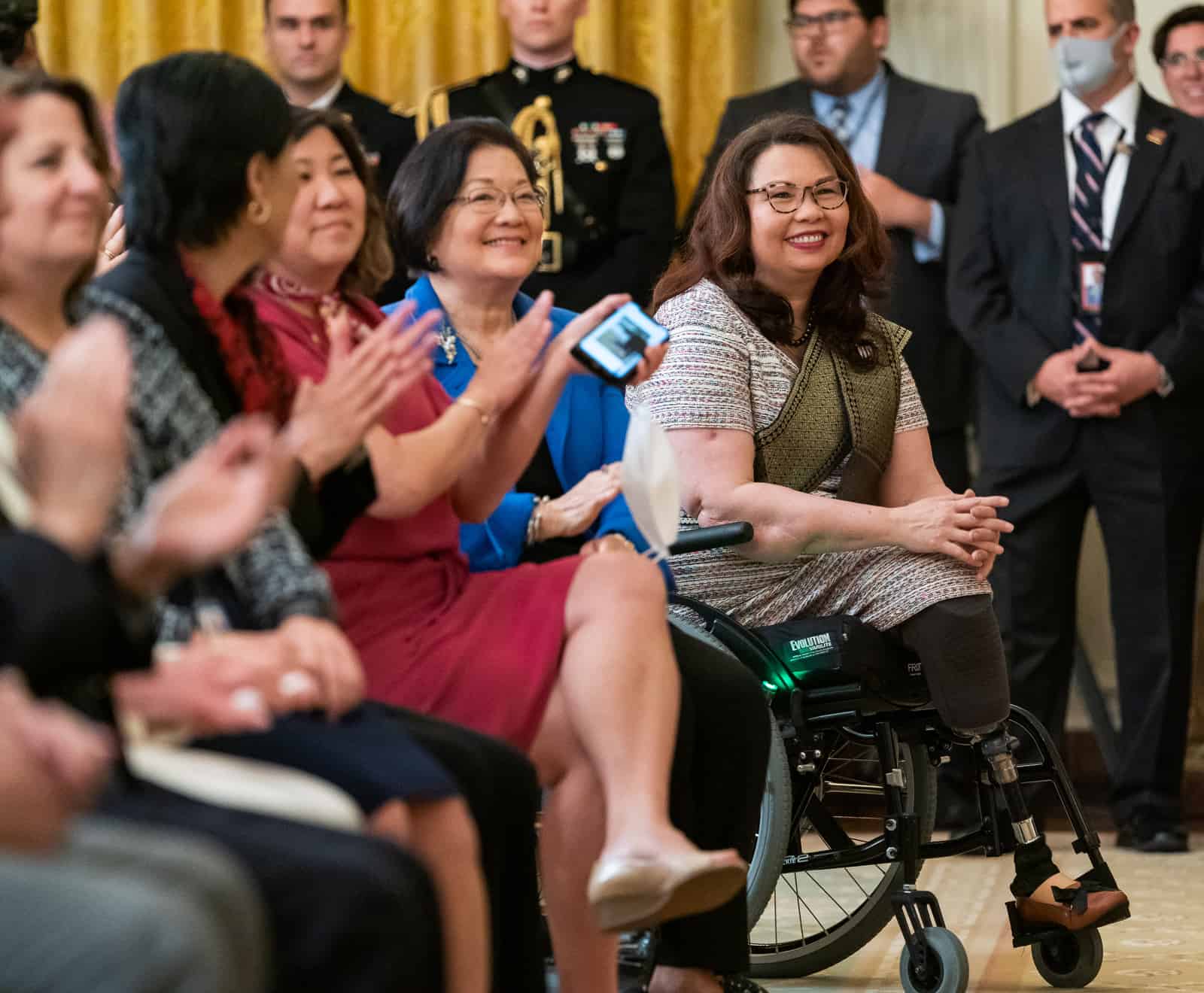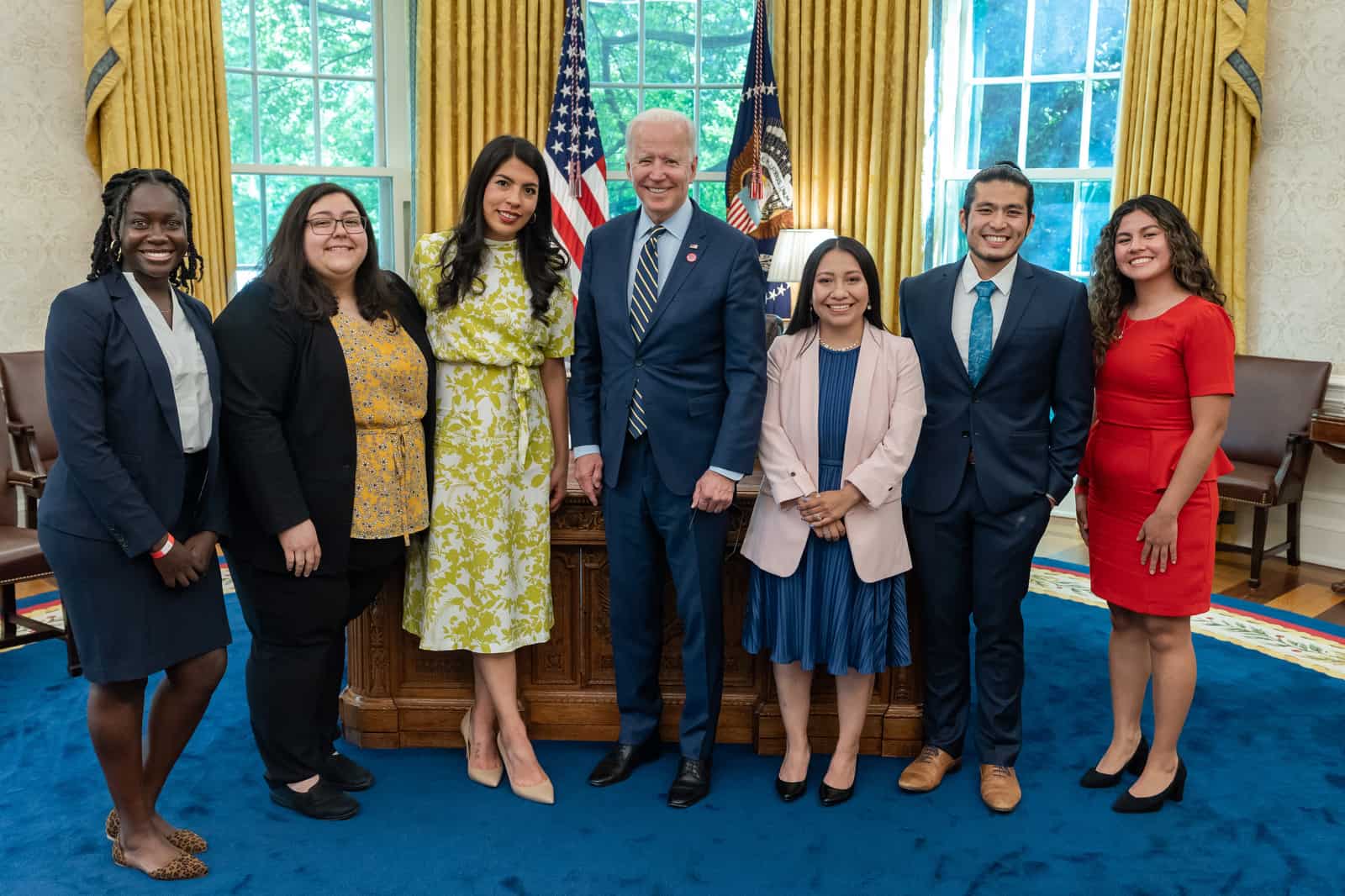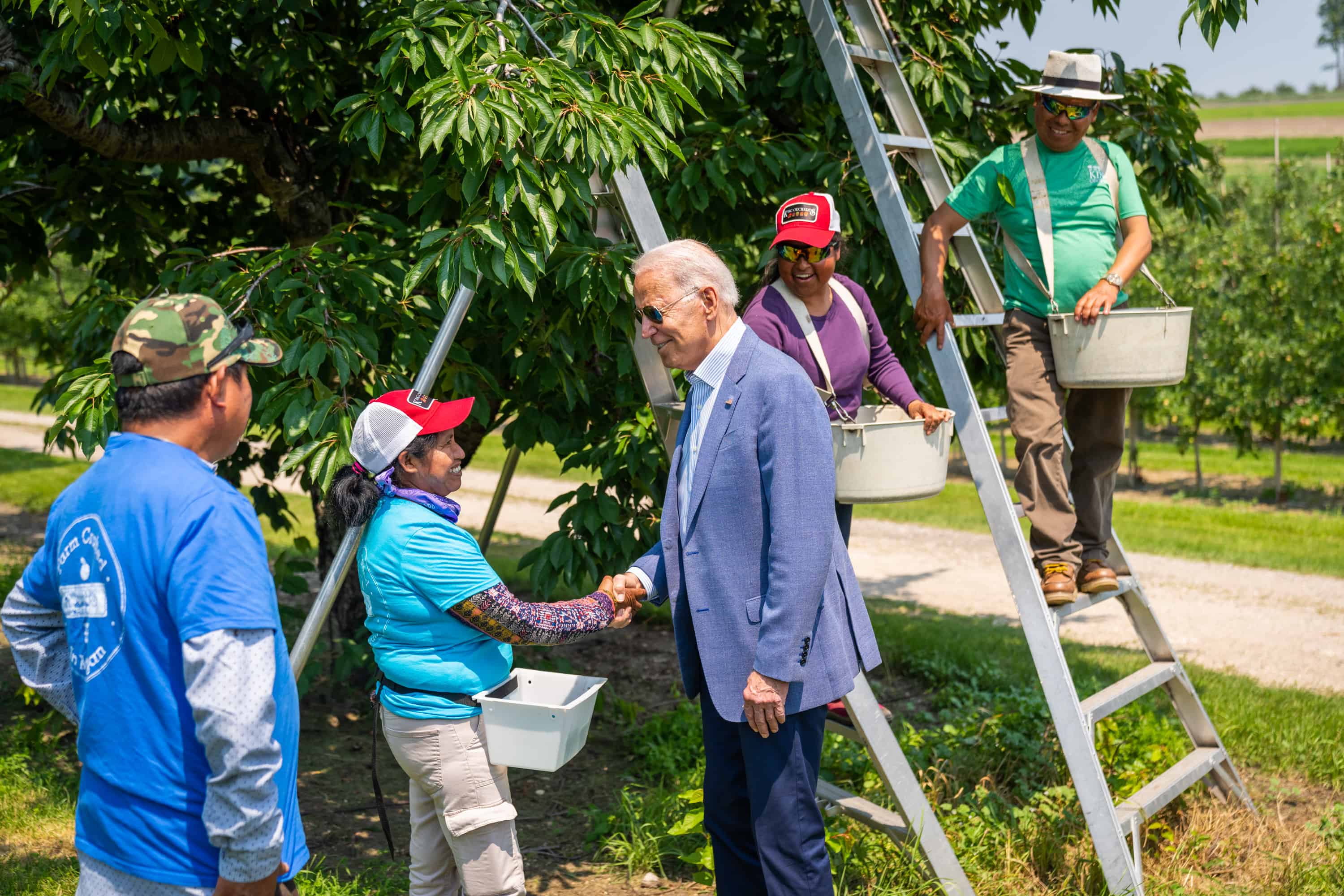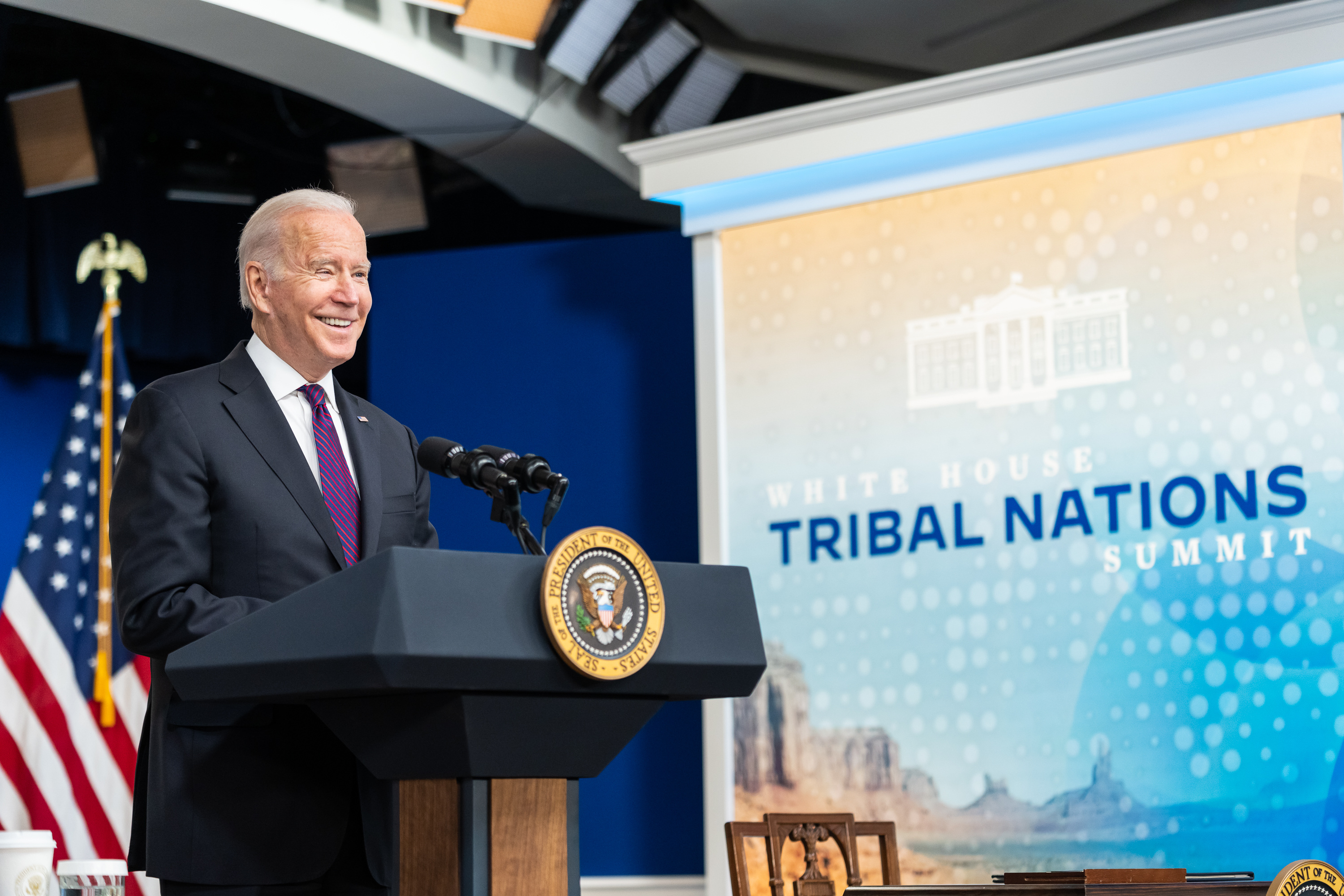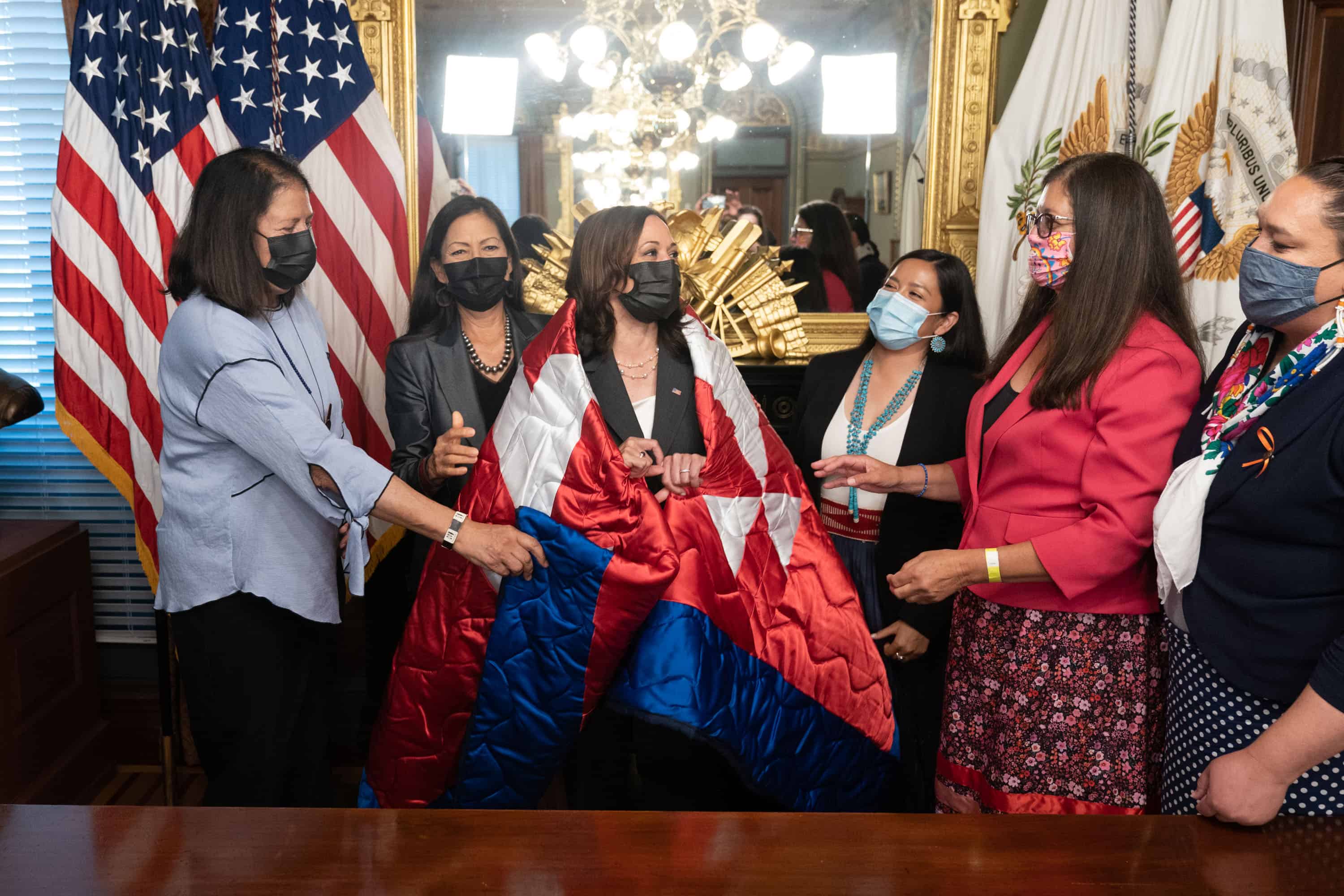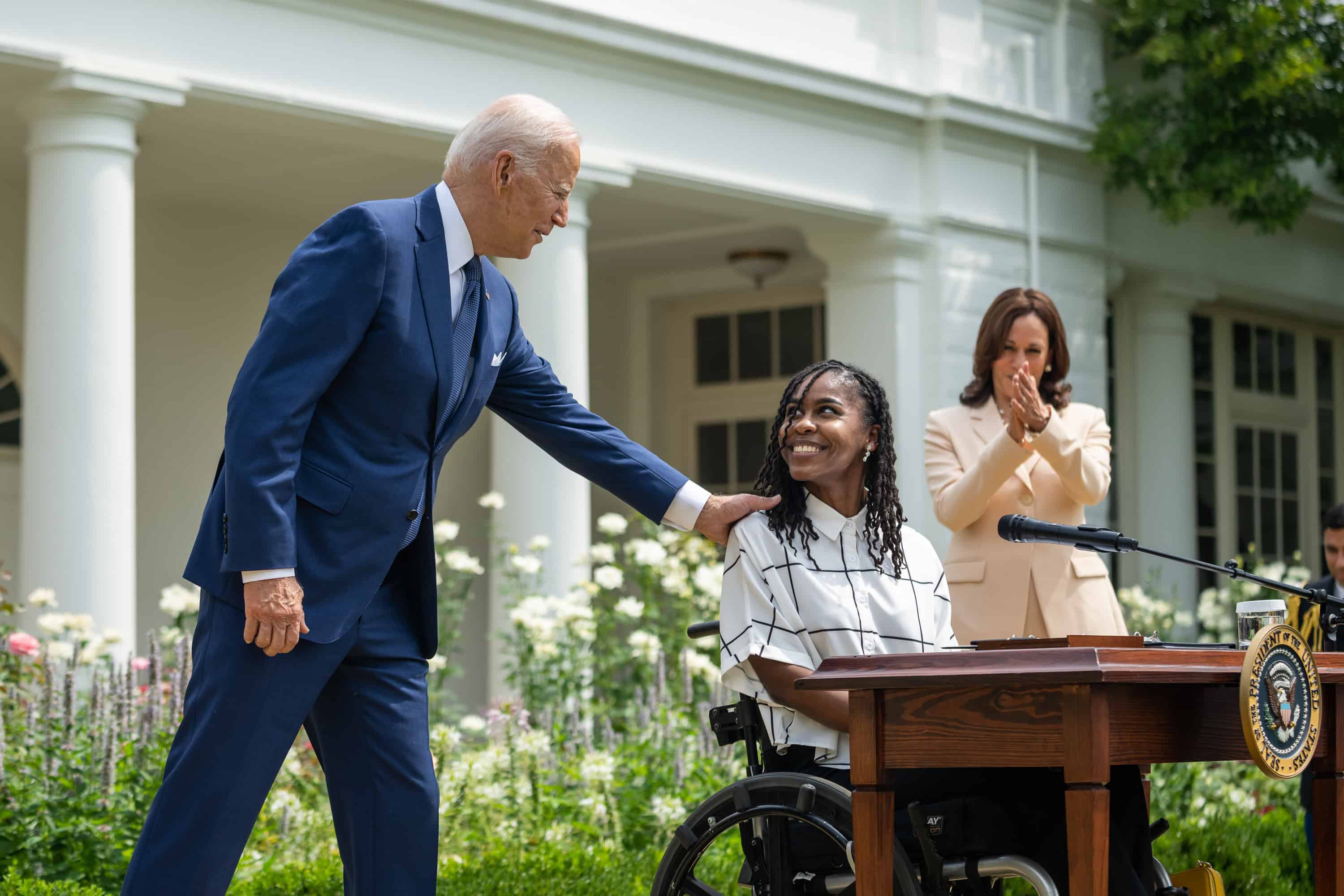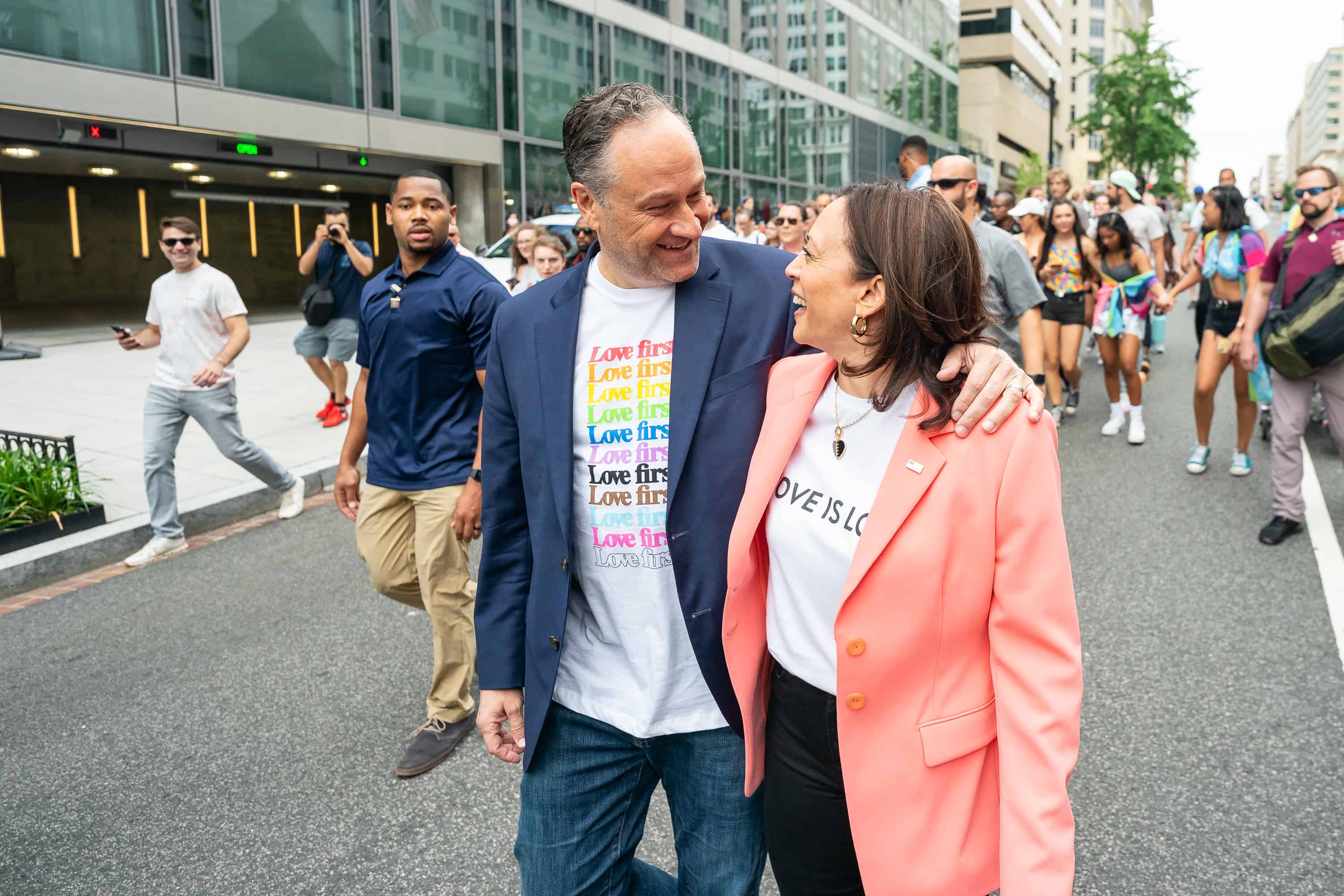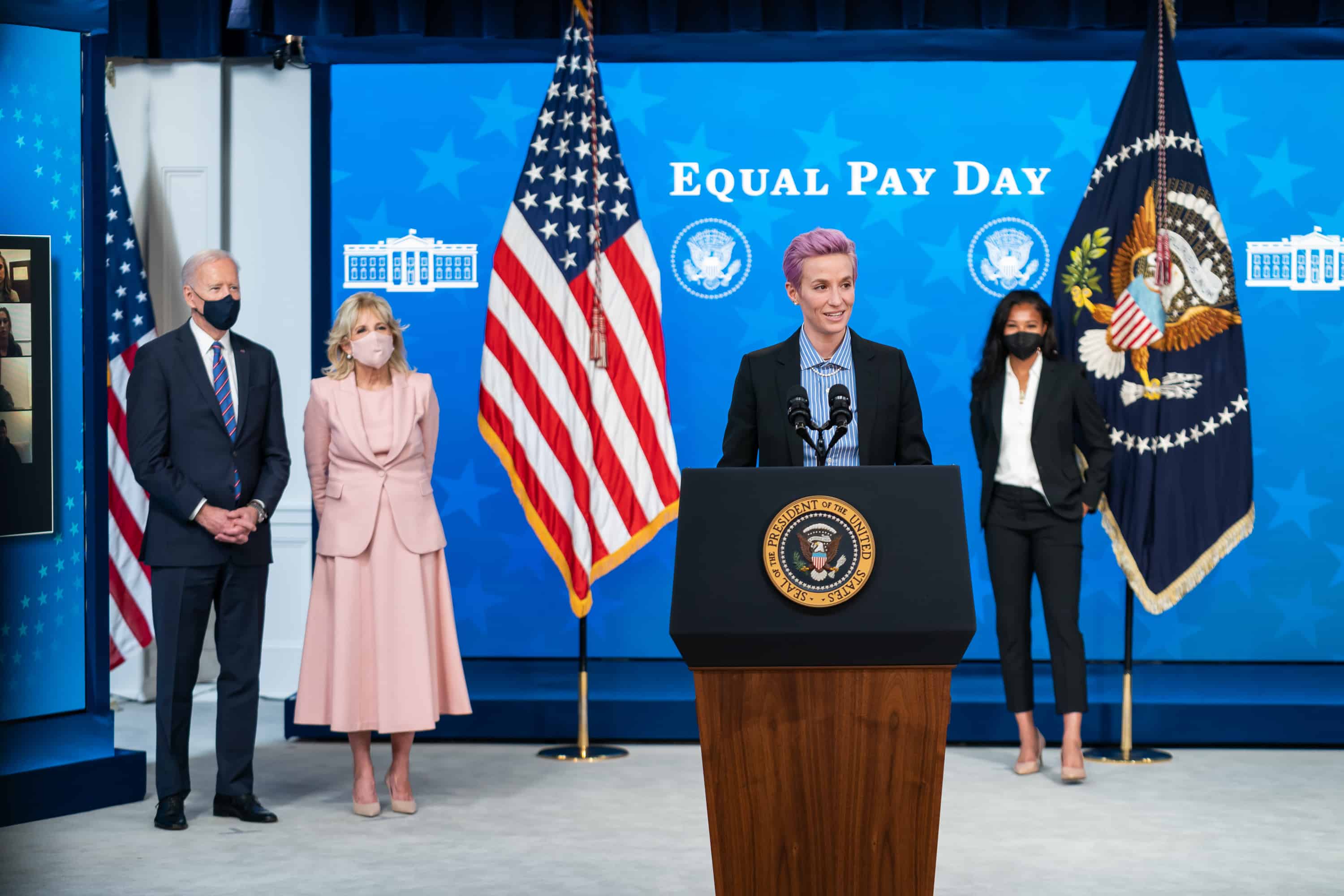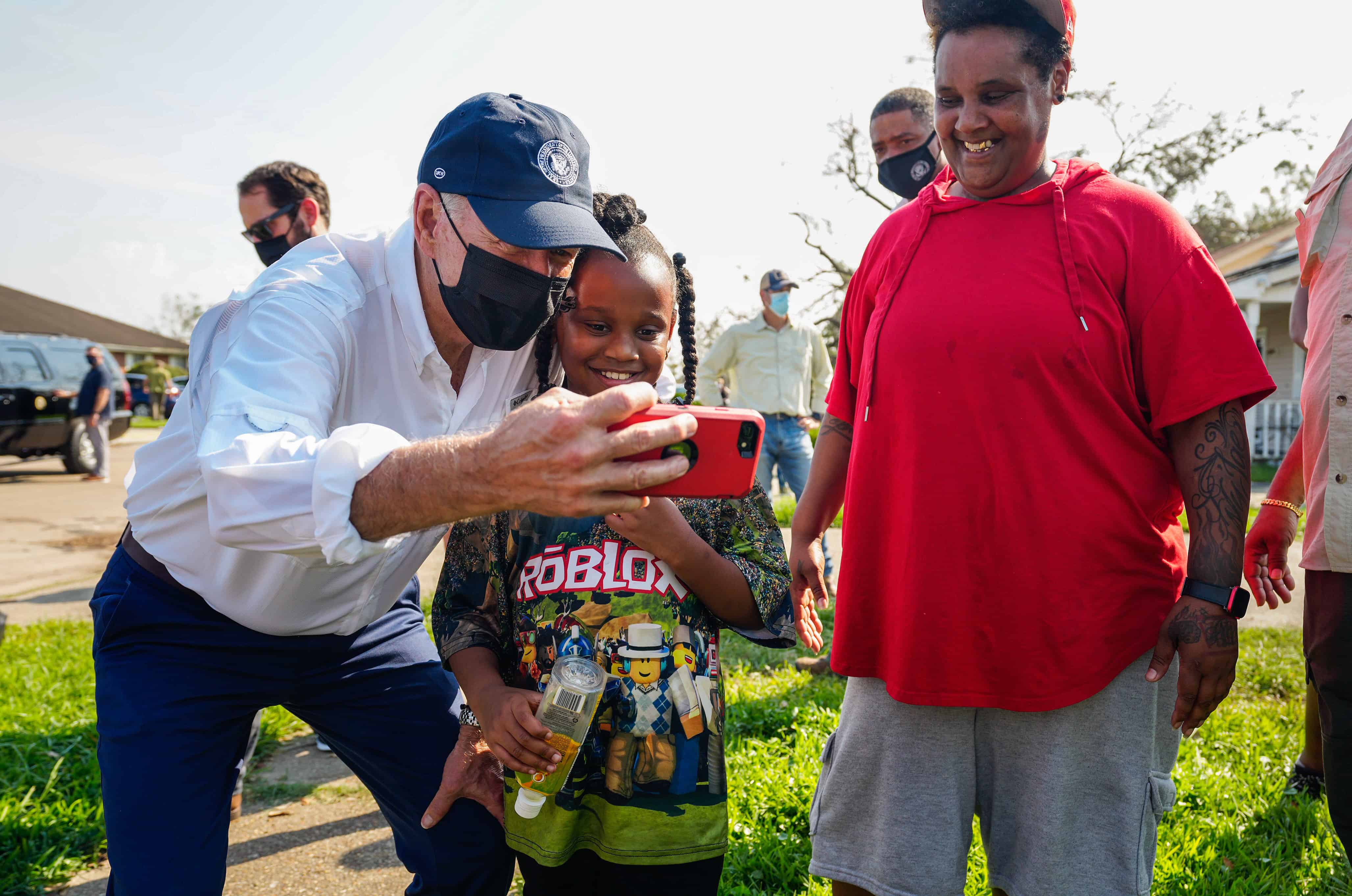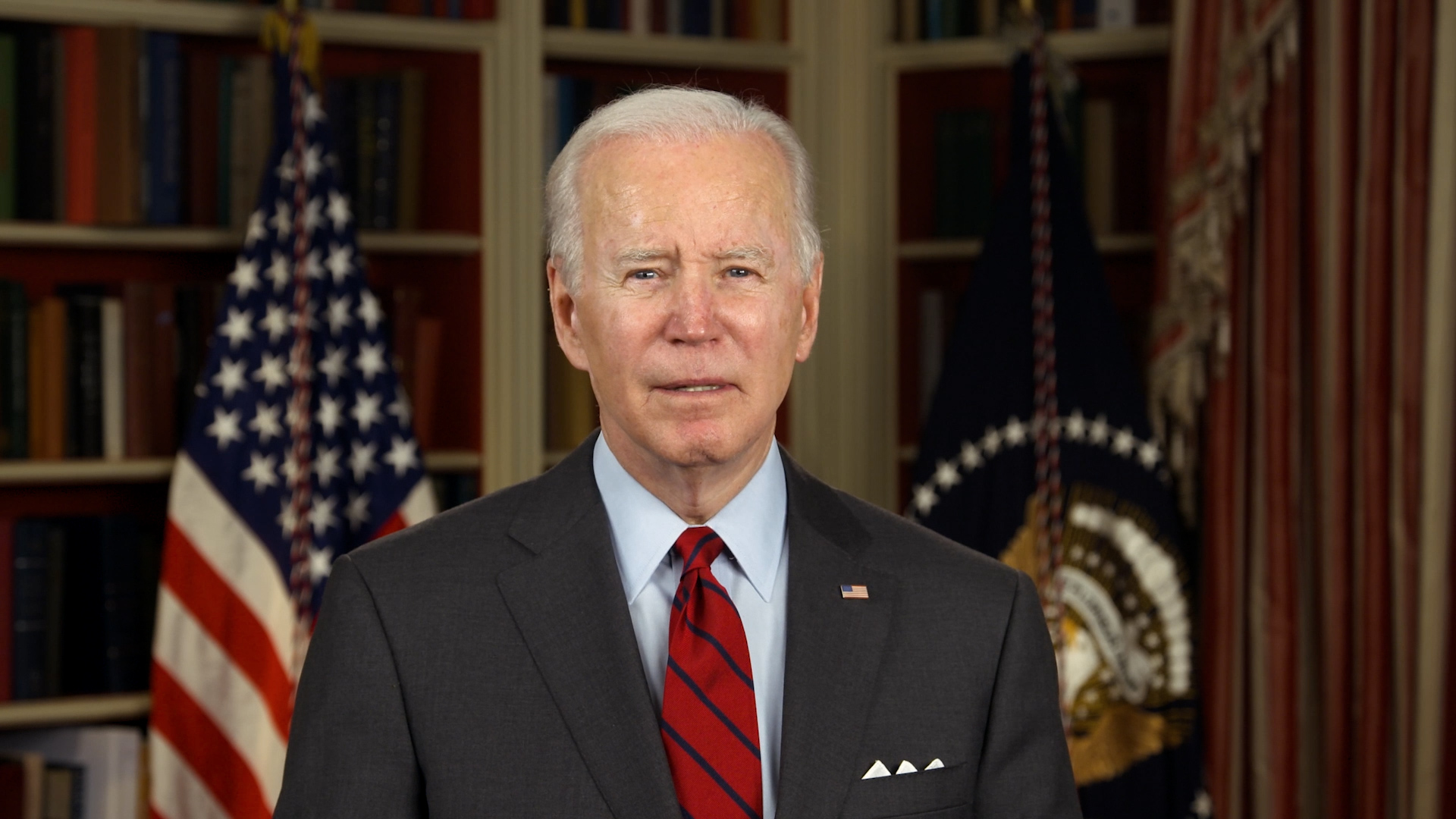Advancing Equity and Racial Justice Through the Federal Government
“It is therefore the policy of my Administration that the Federal Government should pursue a comprehensive approach to advancing equity for all, including people of color and others who have been historically underserved, marginalized, and adversely affected by persistent poverty and inequality. Affirmatively advancing equity, civil rights, racial justice, and equal opportunity is the responsibility of the whole of our Government.”
Executive Order 13985
On his first day in office, President Biden signed Executive Order 13985, Advancing Racial Equity and Support for Underserved Communities Through the Federal Government. The Order recognized that, although the ideal of equal opportunity is the bedrock of American democracy, our laws, public policies, and institutions too often exacerbate disparities or deny equal opportunity to individuals and communities. The President’s Order emphasized the enormous human costs of systemic racism, persistent poverty, and other disparities, and directed the Federal Government to advance an ambitious, whole-of-government equity agenda that matches the scale of the challenges we face as a country and the opportunities we have to build a more perfect union.
In recognition that advancing equity is a generational commitment that will require sustained federal leadership and partnership with all communities, President Biden signed Executive Order 14091 on February 16, 2023. The President’s second Executive Order on equity directs the Federal Government to further build equity into the everyday business of government and continue the work to make the promise of America real for everyone, including rural communities, communities of color, Tribal communities, LGBTQI+ (Lesbian, Gay, Bisexual, Transgender, Queer, and Intersex) individuals, people with disabilities, women and girls, and communities impacted by persistent poverty.
Over the last three years, the Biden-Harris Administration has championed racial equity and further advanced equal opportunity for underserved communities through landmark legislation including the American Rescue Plan, Bipartisan Infrastructure Law, CHIPS and Science Act, and Inflation Reduction Act, as well as through historic executive actions. 90 agencies across the Federal Government created and released Equity Action Plans on April 14, 2022 — first-of-their-kind roadmaps to address the barriers and discrimination that underserved communities face. However, members of underserved communities — many of whom have endured generations of discrimination and disinvestment — still confront significant barriers to realizing the full promise of America: persistent poverty and food insecurity; unequal distribution of state and local school aid; inequitable access to clean water and clean air; and exposure to environmental toxins in rural, urban, and Tribal communities, and in U.S. territories; pay inequities that overwhelmingly impact women, people of color, and people with disabilities; poor health outcomes, including disparities in maternal health; and unequal access to loans and bias in the housing appraisal system. The Federal Government has a responsibility to make every effort to remove these barriers and ensure equal opportunity for every person in America.
In accordance with Executive Order 14091, federal agencies updated their Equity Action Plans in 2023, to address potential barriers that underserved communities may continue to face in accessing and benefitting from the agency’s policies, programs, and activities, including procurement, contracting, and grant opportunities. The updated Plans include over 100 new commitments and strategies that 23 of the largest federal agencies will undertake in 2024 and beyond, as well as new actions from smaller and independent agencies, to advance racial equity and support for underserved communities under the umbrella of eight whole-of-government equity objectives. These collective efforts are furthering the Biden-Harris Administration’s priority of building a more equitable nation. Learn about the Biden-Harris Administration’s progress to advance racial equity and support for underserved communities in a new report, which includes a sample of the more than 650 accomplishments since the release of the 2022 Equity Action Plans.
The Biden-Harris Administration has a far-reaching equity agenda, which also includes implementing the first-ever national strategy on gender equity and equality; working to ensure the Federal Government is a model for diversity, equity, inclusion, and accessibility in the workforce; delivering environmental justice through the Justice40 Initiative; and advancing LGBTQI+ civil rights. These commitments also reflect attention to the reality that some individuals experience discrimination based on multiple factors.
The Administration remains committed to deepening the partnership between government and individuals and communities impacted by discrimination to deliver more equitable outcomes across our nation.
EXPLORE THE WHOLE-OF-GOVERNMENT EQUITY OBJECTIVES AND 2023 AGENCY EQUITY ACTION PLANS
- Department of Agriculture
- Department of Commerce
- Department of Defense
- Department of Education
- Department of Energy
- Department of Health and Human Services
- Department of Homeland Security
- Department of Housing and Urban Development
- Department of the Interior
- Department of Justice
- Department of Labor
- Department of State
- Department of Transportation
- Department of the Treasury
- Department of Veterans Affairs
- Environmental Protection Agency
- General Services Administration
- National Aeronautics and Space Administration
- National Science Foundation
- Office of Personnel Management
- Small Business Administration
- Social Security Administration
- U.S. Agency for International Development
Read the full agency Equity Action Plans at www.performance.gov/equity
Economic Justice
President Biden is renewing the Federal Government’s commitment to making the American Dream real for all Americans across the nation by taking bold and ambitious steps to build a more equitable economy. To meet this mandate, agencies are advancing equity for workers and jobseekers who face barriers and discrimination, strengthening social safety net programs that provide economic security, and closing wealth gaps by supporting wealth building and growing opportunities for entrepreneurs and businesses across America’s supplier base, including those from historically disadvantaged and underserved communities.
Educational Equity
From Pre-K through postsecondary and adult learners, education has the power to bring the American Dream within reach of every individual and meet our nation’s vast potential. To meet this potential, agencies are reckoning with and addressing the long-standing disparities that underserved students and communities face in achieving equitable educational opportunities.
Environmental Justice
For far too long, environmental policy decisions have failed to adequately account for environmental injustice, including the disproportionate and cumulative impacts pollution and climate change have on low-income communities and communities of color. President Biden has made clear that his Administration will chart a new and better course by advancing environmental justice, including through implementation of the Justice40 Initiative which will ensure that 40% of the benefits of investments in clean energy reach disadvantaged communities.
Civil Rights
Advancing civil rights is fundamental to making real the promise of our nation – that we are all created equal and deserve to be treated equally throughout our lives. Affirmatively advancing and robustly enforcing civil rights is a central aspect of the government’s work to deliver more equitable outcomes for underserved communities. Agencies are reinvigorating the work of their civil rights offices to proactively deliver justice and equal protection under law to underserved communities facing discrimination, including addressing barriers to language access and ensuring the full rights of people with disabilities.
Health Equity
A once-in-a-century pandemic highlighted and exacerbated pre-existing disparities in our health care system. As our nation continues to heal from the effects of COVID-19, President Biden has taken swift action to ensure an equitable recovery and lower health care costs for millions of people. Federal agencies are advancing health equity, strengthening community-based health care ecosystems and partnerships, addressing systemic inequities across social determinants of health, and expanding access to quality and affordable health care to meet the needs of underserved communities.
Criminal Justice
Too many people—disproportionately Black and brown people as well as poor people—are incarcerated and face systemic disparities in our nation’s criminal justice system. Many Americans face an uphill struggle to secure a decent job, stable housing, and basic opportunity when they are released from jail or return from prison. At the same time, gun violence disproportionately takes the lives of Black, brown, and Native American people; addressing this urgent problem through prevention, intervention, and enforcement is a matter of racial equity. The Biden Administration is working to reduce incarceration, end racial disparities in the criminal justice system, and facilitate successful reentry, while keeping our communities safe and working to end the epidemic of gun violence.
Housing Justice and Community Investment
Diverse and inclusive communities strengthen our democracy. But during the 20th century, federal and local governments systematically implemented discriminatory housing, transportation, and community investment policies that segregated neighborhoods, inhibited equal opportunity and wealth creation, led to the persistent undervaluation of properties, and placed the disproportionate burden of pollution in communities of color and low-income communities. Federal agencies are addressing their historic roles in systematically disinvesting in communities of color, rural communities, and communities facing persistent poverty.
Global Equality
Strengthening inclusive democracies worldwide is a core tenet of the Biden Administration’s foreign policy. To advance this goal, agencies are using American leadership abroad to advance equity, human rights, and full inclusion for communities that are underserved or face barriers to inclusion.
Embedding equity in the everyday business of government
The 2023 updates to the federal agency Equity Action Plans include innovative strategies that agencies are using to embed equity in day-to-day governing.
The onerous experiences that individuals and entities can encounter when trying to access a public benefit are known as “administrative burdens.” These burdens can include long lengths of time spent on applications and paperwork, answering duplicative notices and phone calls to verify eligibility, and navigating outdated government websites. Research indicates that administrative burdens disproportionately negatively impact underserved communities, leading to underutilization of critical services and programs, as well as unequal costs of access, often by the people and communities who need government services the most. When agencies work to mitigate administrative burdens, their efforts advance equity, meet the needs of underserved communities, and improve efficiencies. Agencies are reducing administrative burdens by:
- Reducing the complexity of applications and other forms and ensuring the instructions are clear and comprehensible
- Ensuring notices are written in plain language and incorporate design best practices (such as prioritizing key information in headings, text boxes, and bold text, and excluding information not relevant to the immediate task at hand)
- Shifting more in-person interview requirements to telephone or video-teleconference
- Conducting proactive outreach to individuals who may be unlikely to respond to typical notices, such as individuals who do not speak English as their native language, individuals with vulnerable housing situations, or individuals with certain cognitive impairments
Stakeholder engagement is critical to identifying innovative solutions with the communities who are most directly impacted by inequitable policies. Many federal agencies already conduct stakeholder engagement processes (including notice-and-comment sessions, town halls, forums, requests for information, and other forms of public engagement). However, these efforts are often perceived by stakeholders and agencies alike as being inaccessible or disconnected from the needs, interests, and priorities of diverse populations. When agencies engage stakeholders through equitable processes, they increase community trust in government, which enables agencies to have better information about community challenges and to learn about local innovation on the ground which could be scaled up, which can improve policymaking and service delivery. Agencies are enhancing stakeholder engagement by:
- Inviting genuine community discussion and debate on issues that are meaningful in the lives of everyday people
- Engaging trusted community intermediaries and accessible, relevant channels between underserved populations and government
- Tailoring forums, listening sessions, consultations, and other forms of engagement to make participation a realistic option (e.g., a listening session scheduled in the middle of a weekday is not likely to attract participants who do not have the flexibility to rearrange their work schedules to attend)
- Recognizing that meaningful communications channels will differ in rural and urban settings or different regions of the country (e.g., technology may be a solution in some instances and a barrier in others, especially to those without broadband access or with only a basic cellphone and limited data plans)
The Federal Government is the world’s largest and most influential buyer. By making federal procurement opportunities more readily available to all eligible vendors and by removing the barriers faced by underserved communities and individuals to entering the federal marketplace, equitable procurement is a core strategy for addressing wealth gaps. Too often, however, small disadvantaged businesses (SDBs) must spend countless hours and tens of thousands of dollars learning how to navigate government contracting processes to compete against larger and more experienced firms. This can be a serious barrier to entry for SDBs. Agencies are expanding equitable procurement opportunities to implement the President’s commitment to increase federal investment in SDBs to 15%—an estimated additional $100 billion—by 2025. Actions include:
- Identifying and then using communication channels that are accessible to communities to make more meaningful connections with a broader range of businesses (e.g., with local chambers of commerce, supplier scouting, business development, and technical assistance programs)
- Creating better information about procurement opportunities and buying trends and promoting greater transparency
- Reducing agency administrative burden in procurement and contracting
- Using programs to address inequity, such as section 503 of the Rehabilitation Act and the AbilityOne Program, which are designed to expand job opportunities for people with disabilities
Federal funding disbursed through grantmaking supports activities that touch every American, including medical research, infrastructure, student aid, public housing, and disaster assistance. These funds are available to individuals, companies, universities, non-profit organizations, state, Tribal, territorial, and local governments, and small businesses. Yet, persistent barriers make it difficult for under-resourced and underserved communities to compete for and effectively deploy such funds. For example, grants managers in organizations that have received federal funding report spending more time on burdensome compliance activities than on supporting program results. Federal financial management policies can play a significant role in ensuring that federal resources are allocated equitably. Agencies are embedding equity in grantmaking by:
- Helping underserved communities learn about and navigate federal funding opportunities, providing technical assistance throughout the application process, and making federal funding applications simpler and easier to navigate
- Reducing administrative burdens in grants applications and in compliance activities
- Ensuring that application reviews are equitable by using evidence-informed decision-making processes
- Including consideration of equity impacts in Notices of Funding Opportunity, and tracking the extent to which financial activities as budgeted advance equitable outcomes
The Federal Government’s ability to collect and analyze disaggregated data is essential for advancing equitable outcomes. That is why President Biden’s day one Executive Order on equity established a first-of-its-kind Equitable Data Working Group to coordinate with agencies to expand their collection and use of demographic data and other equity data. Better demographic data can offer insight into whether government programs, benefits, and services are reaching all communities. Agencies report several challenges to equitable data collection and reporting. Access to data is sometimes restricted by statute—for example, available only in restricted environments to avoid compromising individuals’ privacy. In other cases, data needed to answer a question or respond to an issue do not exist at all, or currently only exist at a very low quality. For example, even when data may be collected by race and gender, it may not allow or enable research or evaluation at the intersection of race, gender, and other characteristics (e.g., examining the impact of a policy on those who are Asian American and also identify as women, or on Latinos who live in suburban areas). Agencies are improving equitable data practices by:
- Identifying the specific barriers that the agency faces and designing agency-specific initiatives to address those barriers and building capacity for equitable data science, including for intersectional analysis
- Addressing the data barriers that uniquely impact specific communities, for example by improving the collection of disaggregated data on Asian Americans, Native Hawaiians, and Pacific Islanders (AA and NHPI) , and increasing the collection of data of sexual orientation and gender identity (SOGI)
- Where lawful, facilitating the sharing of information and practices to increase equitable data collection and access to such data, and enhance cross-agency data sharing
- Developing practices across agencies to determine when and how to efficiently, effectively, and respectfully acquire disaggregated data—including race, ethnicity, gender, identity, sexual orientation, and disability data
Delivering equity in the Biden-Harris Administration
The Biden-Harris Administration’s commitment to equity has delivered concrete results for communities that have often been underserved by the Federal Government:
Delivered historic efforts to reduce poverty
- Brought child poverty to its lowest level on record in 2021 – with record low Black, Asian American, American Indian, Alaska Native, and Hispanic child poverty, driven by the expansion of the Child Tax Credit. The President continues to call on Congress to reinstate the full expanded Child Tax Credit so that we can lift millions of children out of poverty again.
- Provided summer meals to over 30 million kids, ten times more than the less than 3 million children who got summer meals in 2019.
- Increased the value of Supplemental Nutrition Assistance Program (SNAP) benefits by over $36 per person, per month through updates to the Department of Agriculture’s (USDA’s) Thrift Food Plan.
Ensured an inclusive economic recovery from the COVID-19 pandemic
- Signed and implemented the American Rescue Plan – legislation that has powered historic jobs recovery, delivered 170 million Economic Impact Payments to 85% of all Americans, expanded rent relief for millions of households, and got people back to work. Released a historic assessment of how the Federal Government’s economic recovery efforts impacted underserved communities by releasing the American Rescue Plan Equity Report, reviewing the outcomes of 32 different American Rescue Plan programs that represent nearly $900 billion or 60 percent of the American Rescue Plan.
- Released $260 million to eliminate administrative barriers that disproportionately prevent workers of color from completing benefit applications, like accessing unemployment insurance.
- Provided Restaurant Revitalization Funds to support over 72,000 restaurants owned by women and people of color.
- Made Emergency Rental Assistance payments to over 4 million renters, 80% of whom make below 30% of area median income.
- Oversaw the largest calendar year drop in Hispanic unemployment on record.
- Invested $500 million in workforce training partnerships across 31 states and Puerto Rico to help secure high-quality jobs that include good pay, benefits, and career mobility for an expected 50,000 Americans, prioritizing workers from underserved communities in urban and rural areas.
- Invested nearly $100 million in grants to help minority and other underserved entrepreneurs seeking capital to grow and scale their businesses.
- Provided $3.1 billion in funding to distressed USDA farm loan borrowers and $2.2 billion in assistance to farmers who have experienced discrimination in USDA’s farm lending programs, under the Inflation Reduction Act.
Signed historic legislation to address the climate crisis and lower costs for working families
- Signed the Inflation Reduction Act to deliver on the promise to build an economy that works for working families and communities that have been on the frontline of climate change. The Inflation Reduction Act lowers costs, advances environmental justice while building a cleaner future, and grows the economy from the bottom up and the middle out by creating good-paying, union jobs across the country. The Inflation Reduction Act will:
- Lower health care costs, including prescription drug costs, and expand health insurance coverage – advancing health equity and access for low-income and underserved communities. The law caps the amount that Medicare beneficiaries pay for prescription drugs at $2,000 per year and caps the amount that seniors will have to pay for insulin at $35 for a month’s supply. The law also lowers health insurance premiums and expands health care coverage, disproportionately helping communities of color who are more likely to be uninsured.
- Take the most aggressive action on climate and clean energy in American history by making it more affordable for families to purchase energy efficient appliances, and protecting communities of color who are more likely to be impacted by pollution and environmental hazards.
- Create Environmental Justice Block Grants, a dedicated program to tackle pollution in port communities – where air pollution is especially dense and deadly.
- Advance transportation equity and resilience with a new Neighborhood Access and Equity Grant program to improve walkability, safety, and affordability, including projects to protect against extreme heat, flooding, and other impacts.
- Expand urban forestry programs with tree-planting projects that help cool neighborhoods, with a priority for projects that benefit underserved communities.
- Lower the deficit and ask the ultra-wealthy and corporations to pay their fair share.
- Ensure that no one earning under $400,000 per year will pay a penny more in taxes.
Delivered equitable infrastructure investments
- Signed and implemented the Bipartisan Infrastructure Law, providing an historic opportunity to advance equitable outcomes in underserved communities, and making long overdue investments in communities of color, rural communities, and persistent poverty communities that have faced decades of disinvestment and harmful investments in infrastructure. The Bipartisan Infrastructure Law will:
- Bring clean drinking water to the 10 million American households that still face lead pipe exposure.
- Close the digital divide by connecting the 30 million Americans who live in areas where there is no broadband or high-speed internet.
- Invest $21 billion to address the legacy of pollution that harms the health of disadvantaged communities.
- Invest $92 billion to repair and modernize our public transportation systems – which communities of color are twice as likely to rely upon to get to work.
- Fund a new $1 billion program to reconnect communities harmed by previous infrastructure investments, like communities of color that were further segregated by federal highway construction.
- Create millions of good-paying union jobs, expanding employment opportunities for underserved communities, and addressing the barriers that workers of color, women, and people with disabilities face in accessing jobs in high growth trades industries.
- Invested nearly $1.9 billion in underserved rural communities for projects such as expanding access to housing and water infrastructure in FY 2022.
- Launched the Rural Partners Network (RPN), an all-of-government program to transform the way federal agencies partner with rural places to create economic opportunity. The RPN helps rural communities find resources and funding to create jobs, build infrastructure, and support long-term economic stability on their own terms. The RPN has expanded and now includes 36 community networks across 11 states and Puerto Rico.
- Launched the Thriving Communities Network, a multi-agency program to support underserved communities access federal support and technical assistance to take transformative infrastructure projects from concept to completion. The Network provides place-based technical assistance and capacity-building resources to urban, rural, and Tribal communities experiencing a history of economic distress and systemic disinvestment. This effort includes resources to help disadvantaged communities with grant and financial management, pre-development assistance, community engagement, planning, and project delivery support.
- Launched a new Voluntary Community-Driven Relocation program to assist Tribal communities severely impacted by climate-related environmental threats, leveraging the Bipartisan Infrastructure Law and Inflation Reduction Act to commit $115 million for 11 severely impacted Tribes to advance relocation efforts and adaptation planning.
Expanded opportunities for small disadvantaged businesses
- Set a government-wide goal to increase the share of federal contracting dollars awarded to small disadvantaged businesses (SDBs), including minority-owned businesses, by 50% by 2025 and thereby investing $100 billion in such businesses to help close the racial wealth gap. The first two years of the Biden-Harris Administration have marked record performance in terms of share of contracting dollars reaching SDBs.
- Announced reforms to the federal procurement process to help meet the President’s ambitious target and deliver new opportunities for small disadvantaged businesses, including minority-owned businesses.
Addressed discrimination in the housing market
- Launched the interagency Task Force on Property Appraisal and Valuation Equity (PAVE) to address inequity in home appraisals on June 2, 2021, the 100th anniversary of the Tulsa Race Massacre. On March 23, 2022, the Task Force published the PAVE Action Plan, the most wide-ranging set of reforms ever put forward to advance equity in the home appraisal process. The Administration is implementing the action plan to make the appraisal industry more accountable, empower homeowners and homebuyers, and help ensure that every American has a chance to build generational wealth through homeownership.
- Signed a Presidential Memorandum directing HUD to redress the Federal Government’s history of discriminatory housing policies and practices.
- Proposed a new Affirmatively Furthering Fair Housing rule that aims to remedy the long history of discrimination and patterns of segregation and proposes mechanisms that would provide greater accountability and transparency to ensure that underserved communities have equitable access to affordable housing opportunities.
Continued to defend the sacred right to vote and civil rights
- Took all-of-government action to promote voting access and to further the ability of all eligible Americans to participate in democracy.
- Called for Congress to pass comprehensive democracy reform legislation— the John R. Lewis Voting Rights Advancement Act and the Freedom to Vote Act—even if it takes ending the Senate filibuster to get it done.
- Doubled the number of attorneys at the Department of Justice who are dedicated to protecting voting rights.
- Protected our democracy by signing the bipartisan Electoral Reform Count Act into law, which establishes clear guidelines for our system of certifying and counting electoral votes for President and Vice President, to preserve the will of the people and to protect against the type of attempts to overturn our elections that led to the January 6, 2021 insurrection.
Advanced health equity and access to affordable health care
- Expanded access to zero-premium and low-premium health insurance plans for uninsured disadvantaged communities and increased enrollment in quality, affordable health coverage, including 16.3 million people who signed up for insurance through the Affordable Care Act Marketplaces.
- Implemented policies to reduce unacceptably high maternal mortality rates among Black and Native American women.
- Secured, for the first time in history, advance appropriations for the Indian Health Service, which will ensure a more predictable funding stream and improve health outcomes across Indian Country.
- Launched a new national strategy for expanding access to mental health care which will address the disproportionate burden of mental illness in communities of color and other low-income communities.
Advanced climate justice
- Launched the Justice40 Initiative to ensure that federal agencies deliver 40% of the overall benefits of climate, clean energy, affordable and sustainable housing, clean water, and other investments to disadvantaged communities.
- Launched the Climate and Economic Justice Screening Tool, which measures burdens such as legacy pollution and projected climate risk and has identified 27,251 geographically-defined disadvantaged communities across the U.S. that can benefit from the Justice40 Initiative.
- Deployed funding through the Weatherization Assistance Program to help low-income households ensure that their homes are dry, clean, and safe, and that their energy bills are more affordable.
- Launched new programs to maximize the benefits of climate and clean energy investments directed to disadvantaged communities.
- Helped underserved communities that are often most vulnerable to the impacts of climate change fund hazard mitigation needs for a more resilient future.
- Launched new funds to replace the nation’s existing fleet of school buses with clean and zero-emission buses, ensuring cleaner and healthier air for children and families.
Advanced public safety and criminal justice reform
- Signed a historic Executive Order in May 2022, to advance police reform and build public trust and public safety. The order requires federal law enforcement agencies to ban chokeholds, adopt stricter use-of-force policies, greatly restrict no-knock warrants, implement body-worn cameras, provide de-escalation and anti-racial profiling training, establish a national database of officer misconduct records, enhance use-of-force data reporting, ban the transfer of certain military equipment to local law enforcement, improve officer recruitment and retention, and more. The order has also resulted in new accreditation standards for state and local law enforcement agencies, and guidance to those agencies on matters such as recruiting and retaining a diverse work force and interacting with people experiencing mental health or behavioral crises.
- Signed an Executive Order prioritizing rehabilitation and redemption to ensure time in prison better prepares individuals for the next chapter of their lives, resulting in over 8,000 people in federal custody being moved out of privately operated facilities to date.
- Secured the first dedicated federal funding for community violence intervention (CVI) programs in history—$100 million in each of FY 2022 and FY 2023—through the Bipartisan Safer Communities Act and appropriations. CVI programs have been shown to reduce violence by up to 60%.
- Signed an Executive Order to improve public safety and criminal justice for Native Americans and address the crisis of missing and murdered Indigenous people.
- Directed $1 billion in supplemental funding for domestic violence and sexual assault services, including $49.5 million for culturally-specific community-based organizations that help survivors from historically underserved communities access the services and support they need.
- Took bold action to address our failed approach to marijuana. The criminalization of marijuana possession has upended too many lives—for conduct that is now legal in many states. While white, Black, and brown people use marijuana at similar rates, Black and brown people are disproportionately arrested, prosecuted, and convicted for it. In October 2022, President Biden issued a presidential proclamation that pardoned many federal and D.C. offenses for simple marijuana possession. In December 2023, President Biden issued another proclamation that expanded the relief provided by the original proclamation. The December 2023 proclamation adds to the list of pardoned offenses the following: offenses under federal law for attempted possession of marijuana; additional offenses under the D.C. Code for simple marijuana possession; and violations of certain sections of the Code of Federal Regulations involving simple marijuana possession and use. The December 2023 proclamation also extends the original proclamation by pardoning offenses for simple possession of marijuana in violation of federal law prior to December 22, 2023. And because this Administration is guided by science and evidence, President Biden called on the Department of Health and Human Services and the Department of Justice to expeditiously review how marijuana is scheduled under federal law.
- Established the National Law Enforcement Accountability Database, a database of official records of misconduct by federal officers. In addition, the Department of Justice is working with the organization that runs the National Decertification Index (NDI), an existing database of law enforcement decertifications in all 50 states, to expand it to additional categories of misconduct so that agencies may make more informed hiring decisions.
Fought for gender equity and LGBTQI+ rights
- Released an ambitious gender equity agenda in the first-ever National Strategy on Gender Equity and Equality, which outlines an approach to advance gender equity and equality at home and abroad with attention to compounded burdens that some individuals and communities experience.
- Took historic actions to advance LGBTQI+ equality, including signing the Respect for Marriage Act; expanding non-discrimination protections for LGBTQI+ people in housing, healthcare, education, and the criminal justice system; restoring open service for transgender service members in the military; addressing the crisis of anti-transgender discrimination and fatal violence, taking on the discredited practice of so-called “conversion therapy”; and strengthening the Federal Government’s collection of data on LGBTQI+ communities and the barriers they face.
- Proposed new rules to strengthen Title IX’s protections for students against sexual harassment, misconduct, and assault to ensure that all students, including women, girls, and LGBTQI+ students, can access equal educational opportunity.
Promoted education excellence and equality
- Provided $130 billion to help schools safely reopen and stay open, address learning loss, and support student mental health, with $122 billion in funds distributed according to states’ and districts’ Title I share, benefitting high-poverty communities. This funding is being used to help schools safely operate, and implement high-quality summer learning and enrichment programs, hire nurses and counselors, support the vaccination of students and staff, and invest in other measures to take care of students.
- Implemented a first-of-its-kind maintenance of equity requirement to ensure that high-poverty school districts and schools are protected from funding cuts.
- Delivered over $7 billion in cumulative investment for Historically Black Colleges and Universities (HBCUs) and increased the maximum value of Pell Grants by $400, helping 75% of students in HBCUs, Minority-Serving Institutions, and Tribal Colleges and Universities afford their education.
- Signed Executive Orders on advancing educational equity, excellence, and economic opportunity for Black, Hispanic, and Native students.
- Cancelled $132 billion in student loan debt for 3.6 million student loan borrowers, including:
- Continued delivery on the promise of Public Service Loan Forgiveness (PSLF) for borrowers and strengthening oversight and accountability for colleges, forgiving up to $53.5 billion for almost 750,000 borrowers since October 2021. By contrast, only about 7,000 borrowers had received forgiveness through these programs at the start of the Biden-Harris Administration.
- Released the most affordable repayment plan in history called the Saving on a Valuable Education plan, or “SAVE” plan. This income-driven repayment (IDR) plan will cut borrowers’ monthly payments in half, allow many borrowers to make $0 monthly payments, save all other borrowers at least $1,000 per year, and ensure borrowers don’t see their balances grow from unpaid interest.
- Beyond the relief under IDR and PSLF, approved $11.7 billion in loan forgiveness for almost 513,000 borrowers with a total and permanent disability and $22.5 billion in forgiveness for more than 1.3 million borrowers who were cheated by their schools, saw their institutions precipitously close, or are covered by related court settlements.
- In the wake of the Supreme Court decision on the Administration’s original student debt relief plan, the Administration continues its work to pursue an alternative path to debt relief through negotiated rulemaking under the Higher Education Act.
- Finalized new rules to protect borrowers from career programs that leave graduates with unaffordable debts or insufficient earnings.
- Secured the largest increase to Pell Grants in a decade – increasing the maximum award by $900 over the last two years – to ensure students have more money to pay for college, and expanded access to Pell Grants for incarcerated individuals.
- Launched a Science Mission Directorate Bridge Program to foster partnerships between the Federal Government and HBCUs, Minority-Serving Institutions, Tribal Colleges and Universities, community colleges, and very high research-intensive universities.
Addressed hate-fueled violence and hate crimes
- Directed all commanding officers and supervisors in the Department of Defense to conduct a “stand-down” to discuss extremism in the ranks with their personnel. Released the first-ever National Strategy for Countering Domestic Terrorism, sharpening the country’s understanding of the threat, strengthening community-based efforts to prevent acts of domestic terrorism, and expanding our capabilities to disrupt and prosecute such acts—all while safeguarding privacy, civil rights, and civil liberties.
- Signed the COVID-19 Hate Crimes Act into law and issued new guidance aimed at raising awareness of hate crimes during the COVID-19 pandemic, including the rise in incidents targeting the Asian American, Native Hawaiian, and Pacific Islander communities.
- Hosted the historic United We Stand Summit at the White House. Established the White House Initiative on Hate-Motivated Violence to strengthen interagency coordination, leverage federal research and resources, and enhance engagement in preventing and responding to hate-motivated violence.
- Initiated the mobilization of over $1 billion in new investments to increase support for programs that build bridges among Americans of different backgrounds to foster unity, and established an interagency group with more than 20 federal agencies to counter antisemitism, Islamophobia, and related forms of bias and discrimination. The U.S. National Strategy to Counter Antisemitism was released in May 2023; and in November 2023 the White House announced plans to develop the first-ever U.S. National Strategy to Counter Islamophobia and related forms of hate in the United States.
Established the Federal Government as a model for diversity, equity, inclusion, and accessibility
- Appointed a historically diverse Cabinet, including achieving gender parity among President Biden’s Secretaries, confirming the most Latino Secretaries ever, and confirming the first openly LGBTQI+ Cabinet Member, first Native American Secretary, and first Black Secretary of Defense.
- Hired appointees that look like America – more than half of all President Biden’s appointees are women and half identify as people of color.
- Nominated historically diverse judges, and confirmed the first Black woman in American history to serve as a Justice of the Supreme Court – Judge Ketanji Brown Jackson. In his first two years in office, 65% of President Biden’s judicial nominees were people of color, and 67% were women. In fact, President Biden has confirmed more African American women as circuit court judges than all previous presidents combined. During his first two years in office, President Biden saw 21 Latino federal judges and 17 Asian American, Native Hawaiian, and Pacific Islander federal judges confirmed. President Biden also saw confirmed the first Muslim American federal judge in our country’s history, and the first two openly LGBTQI+ women ever to serve as federal circuit court judges. President Biden has confirmed more federal circuit court judges with experience as public defenders than all prior presidents combined.
- Signed an Executive Order to advance diversity, equity, inclusion, and accessibility in the federal workforce, ensuring public servants at all levels have equal opportunity to succeed and thrive.
Enhanced engagement with communities that have historically been excluded from decision-making processes
- Hosted the third annual White House Tribal Nations Summit in December 2023, to strengthen the Nation-to-Nation relationships the United States has with Tribal Nations and provide Tribal leaders with an opportunity to engage directly with senior Administration officials.
- Signed a new Presidential Memorandum on Uniform Standards for Tribal Consultation, establishing uniform standards to be implemented across all federal agencies regarding how Tribal consultations are conducted.
- Established new federal advisory committees at agencies to better engage impacted Americans and equity experts in shaping federal policy.
- Incorporated Community Benefits Plans requirements into funding opportunities that require applicants to include a description of stakeholder engagement activities and detailed plans to deliver Justice40 benefits to disadvantaged communities, contract and partner with underrepresented groups, and create high-quality jobs.
In Photos
